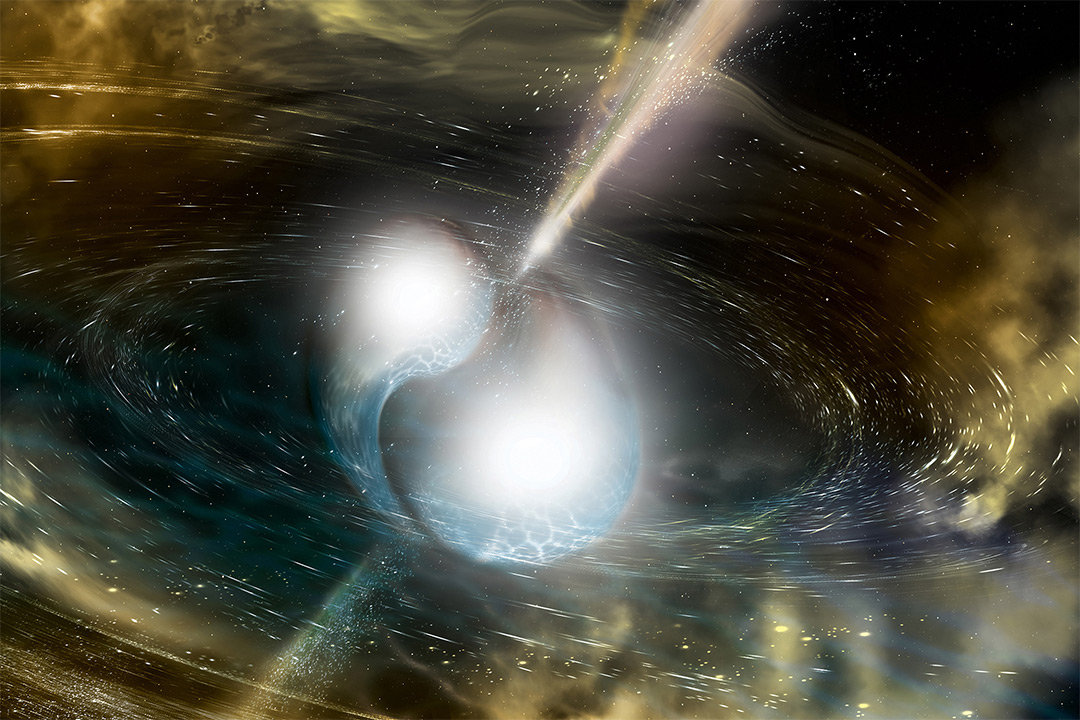
National Science Foundation/LIGO/Sonoma State University/A. Simonnet
Artist’s illustration of two merging neutron stars.
Scientists conducting cutting-edge research in computational astrophysics will converge at Rochester Institute of Technology for two workshops in June. Experts from RIT, NASA Goddard Space Flight Center, Berkeley and other prestigious institutions will speak at the events hosted by RIT’s Center for Computational Relativity and Gravitation (CCRG).
The 2019 edition of the North American Einstein Toolkit workshop will take place June 17-19. The Einstein Toolkit is a community-driven software platform of core computational tools to advance and support research in relativistic astrophysics and gravitational physics. The toolkit has a community of several hundred scientists working together to develop these tools, a set of codes to solve Einstein’s equations for binary black hole collisions, neutron star collisions and other astrophysical systems. This National Science Foundation-funded event will provide an opportunity for researchers and students to learn about the toolkit and discuss its future development.
“Students and other researchers from around the world will be coming to this workshop to learn how to use the Einstein Toolkit to model black hole and neutron star mergers,” said Yosef Zlochower, associate professor of mathematics and co-organizer of the workshops. “For people who are already involved in the toolkit, we will also discuss ideas how to improve it. It’s a community-driven code and we have to decide the new directions to take."
RIT will also host a Theoretical and Computational Astrophysics Networks (TCAN) workshop focused on neutron star mergers from June 19-21 to allow researchers and students to discuss the collaboration’s projects and future developments. The event, funded by NASA, is titled “Advancing Computational Methods to Understand the Dynamics of Ejection, Accretion, Winds and Jets in Neutron Star Mergers.”
Professor Manuela Campanelli, director of the CCRG and co-organizer of the workshops, said the TCAN workshop will provide an important and rare opportunity to bring together experts studying the complex nature of binary neutron star mergers. Interest in the subject has taken off since the National Science Foundation’s Laser Interferometer Gravitational-Wave Observatory (LIGO) and Europe-based Virgo detector first detected neutron stars colliding in 2017, kicking off a new era of multimessenger astronomy.
“This event will be exciting because it will bring together most of the leading experts in the U.S. and Europe trying to solve the binary neutron star problem,” said Campanelli. “One of the holy grails of this field is to try to find out what happens inside these neutron stars. What is the state of matter in such dense conditions and very strong gravity? After they merge, how can you get this very powerful jet that pushes matter out of the collision and produces these signals that we have seen?”
Campanelli also said overlapping the TCAN event with the Einstein Toolkit workshop will help expose the broader community to project’s overall scientific goals.
Registration and additional details for both events are available at https://ccrg.rit.edu/